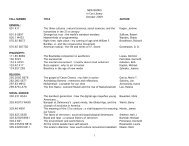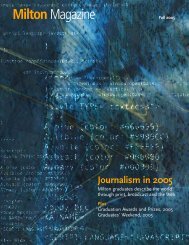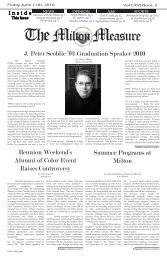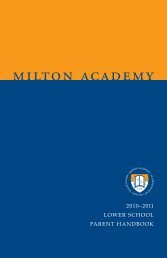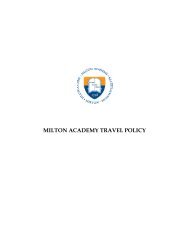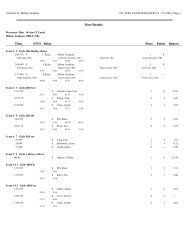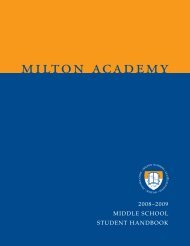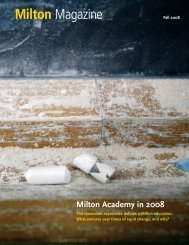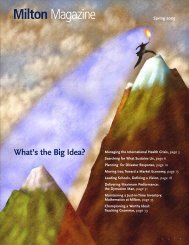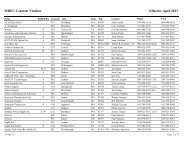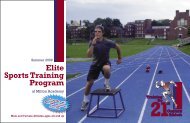Spring 2007 - Milton Academy
Spring 2007 - Milton Academy
Spring 2007 - Milton Academy
- No tags were found...
You also want an ePaper? Increase the reach of your titles
YUMPU automatically turns print PDFs into web optimized ePapers that Google loves.
Henry Louis Gates, Jr.W. E. B. Du Bois Professor of theHumanities, Harvard University;Director of the W. E. B. Du BoisInstitute for African and AfricanAmerican ResearchDr. Gates of Harvard Universitytalked with students on January10 as the <strong>2007</strong> Martin LutherKing Speaker. One of the mostinfluential American culturalcritics, he is widely acknowledgedfor moving AfricanAmerican studies from the ideologicalpositioning of the 1970sand ’80s to a scholarly sphere.Dr. Gates has authored and editedseveral books and writtennumerous articles for The NewYorker, Time Magazine, The NewRepublic and The New York Times.He is also the editor of Transitionmagazine, an internationalreview of African, Caribbean,and African-American politics.Through scholarly efforts such aspublishing bibliographies ofnoted writers—Nigeria’s WoleSoyinka, for example—andrepublishing historical texts likeHarriet Wilson’s Our Nig, or,Sketches from the Life of a FreeBlack, written in 1854, Dr. Gateshas defined an African-Americanliterary and cultural tradition. Healso authenticated and facilitatedthe publication of The Bondwoman’sNarrative by Hannah Crafts,the only known novel by a femaleAfrican American slave and possiblythe first novel by an AfricanAmerican woman. In 1997, Dr.Gates was named one of TimeMagazine’s most influentialAmericans.Lauren GreenfieldNoted by American PhotoMagazine as one of today’s top 25photographers; documentaryfilmmaker of the award-winningfilm, THINLauren Greenfield was on campusNovember 29 throughDecember 1 as this year’s MelissaDilworth Gold Visiting Artist.Ms. Greenfield was one of onlythree females chosen byAmerican Photo Magazine, alongwith Mary Ellen Mark and AnnieLeibovitz. She is the creator of“Girl Culture” and many relatedprojects that deal with the influenceof popular culture on howwe live. Her photography dealsmost specifically with issues ofgender identity, body image andeating disorders. Her photographshave been published regularlyin magazines includingthe New York Times Magazine,Time, The New Yorker, ELLE, andHarper’s Bazaar.Her recent documentary film,THIN, delves into the lives offour women struggling withanorexia and bulimia. The filmwas met with internationalacclaim and premiered at the2006 Sundance Film Festival.John Shelby SpongEpiscopal Bishop of Newark,retired; pastor, professor, author,national critic and commentatorBishop John Shelby Spong visited<strong>Milton</strong> on October 11 as thefourth speaker for the Class of1952 Endowment for ReligiousUnderstanding. With his moderninterpretation of the Bibleand advocacy for social justiceand acceptance across religions,Bishop Spong’s message sparkedmuch discussion, in StrausLibrary, where he met with students,and in classrooms acrosscampus. Overtly faithful andcommitted to the Christian tradition,he claims that by “adheringto the spirit of the Bible, and notto the letter of the Bible [wemight help] build a world wherewe all have the opportunity tolive fully, love wastefully and beall that [we are called to] be.”Serving as a member of the clergyfor nearly 50 years, BishopSpong now spends much of histime writing and speaking, havinglectured at many theologicalinstitutions, including HarvardDivinity School.James Meeks ’97<strong>Milton</strong> alumnus and decoratedveteran of the Iraq WarAs part of <strong>Milton</strong>’s Veterans’ Dayprogram on November 8, alumnusJim Meeks ’97 returned tocampus and spoke with studentsabout his experience as a firstlieutenant in the United StatesArmy, stationed overseas as partof Operation Iraqi Freedom. Afterearning a bachelor’s degree fromHarvard, Jim spent the better partof three years in Ramadi andBaqubah, Iraq, in the 34 ArmorBattalion. As the officer in chargeof Task Force Centurion’s detentionfacility in Ramadi, he wasresponsible for the supervision,health and welfare of sevenprison guards, four interrogatorsand up to 90 Iraqi detainees, anexperience that he described as“eye-opening.”Injured by a roadside bomb duringhis first tour of duty, Jim wassent back to the U.S. to recoverand decided to return to Iraq tocontinue the mission alongsidehis fellow soldiers. He impressedstudents with his sense of theethical challenges involved inimplementing any war, the complexityof this particular initiative,and the enormity and scale of theoperation. He left them with theidea that any single soldier knowsonly his experience, and knowingthe “situation” in its entirety is anear impossibility. Jim receivedthe Bronze Star Medal and aPurple Heart for his work in Iraqand is now an M.B.A. candidateat Stanford University.51 <strong>Milton</strong> Magazine



